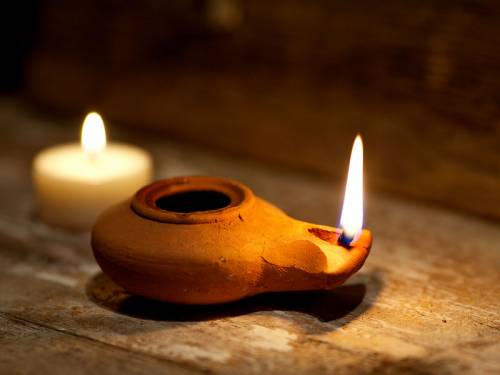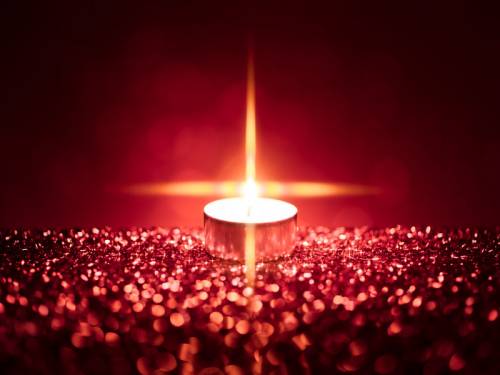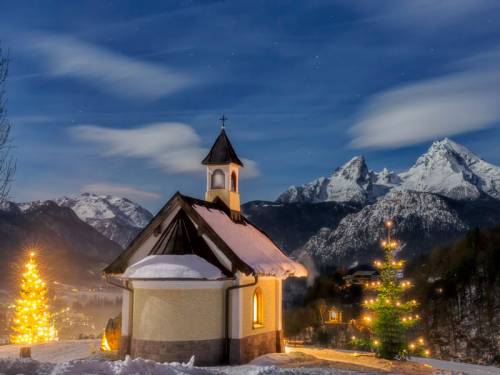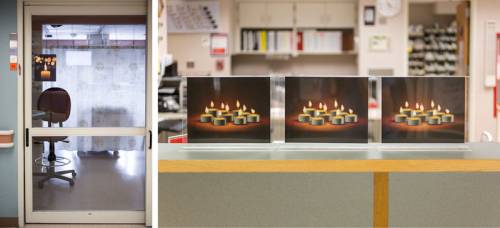Candles of joy despite all the sadness
We begin our Advent journey by lighting the first candle on the Advent wreath. As we watch its flame dance, think about the joy that Scripture speaks of: a joy that doesn’t mean happiness. Rather consider the joy that comes to any heart that knows no matter what circumstances we face, we do not face them alone — Emmanuel, God with us, is indeed with us.
Spend time this week reflecting on where you have experienced such joy. How did it comfort you in seasons of sadness, grief or hopelessness? How can you share that understanding of joy with others?
Day 1 | First Sunday of Advent, Nov. 29
Oil for our lamps
 Then the kingdom of heaven will be like this. Ten bridesmaids took their lamps and went to meet the bridegroom. Five of them were foolish, and five were wise. When the foolish took their lamps, they took no oil with them; but the wise took flasks of oil with their lamps. As the bridegroom was delayed, all of them became drowsy and slept. But at midnight there was a shout, ‘Look! Here is the bridegroom! Come out to meet him.’ Then all those bridesmaids got up and trimmed their lamps. The foolish said to the wise, ‘Give us some of your oil, for our lamps are going out.’ But the wise replied, ‘No! there will not be enough for you and for us; you had better go to the dealers and buy some for yourselves.’ And while they went to buy it, the bridegroom came, and those who were ready went with him into the wedding banquet; and the door was shut. Later the other bridesmaids came also, saying, ‘Lord, lord, open to us.’ But he replied, ‘Truly I tell you, I do not know you.’ Keep awake therefore, for you know neither the day nor the hour. — Matthew 25:1–13
Then the kingdom of heaven will be like this. Ten bridesmaids took their lamps and went to meet the bridegroom. Five of them were foolish, and five were wise. When the foolish took their lamps, they took no oil with them; but the wise took flasks of oil with their lamps. As the bridegroom was delayed, all of them became drowsy and slept. But at midnight there was a shout, ‘Look! Here is the bridegroom! Come out to meet him.’ Then all those bridesmaids got up and trimmed their lamps. The foolish said to the wise, ‘Give us some of your oil, for our lamps are going out.’ But the wise replied, ‘No! there will not be enough for you and for us; you had better go to the dealers and buy some for yourselves.’ And while they went to buy it, the bridegroom came, and those who were ready went with him into the wedding banquet; and the door was shut. Later the other bridesmaids came also, saying, ‘Lord, lord, open to us.’ But he replied, ‘Truly I tell you, I do not know you.’ Keep awake therefore, for you know neither the day nor the hour. — Matthew 25:1–13
Howard Thurman wrote, “There are those who have in themselves the gift of joy. Wherever they go, they give birth to joy in others. To be touched by them is to be blessed by God.” Beatrice had this gift of joy, and she shared it generously throughout her 93 years on earth. Her family spoke at her funeral of how in spite of losing her father at an early age, in spite of being sent to work grueling hours shucking oysters at the age of 10, in spite of being widowed with two children by 20, in spite of the unrelenting seasons of sadness in her life, Beatrice somehow radiated joy. “There was always a gentle smile on her face, even when tears were flowing down her cheeks,” her great-granddaughter recalled.
As the stories about Beatrice continued to be shared, I found myself wondering, “How someone who had faced so much hardship could be remembered as being so joyful?” Then an elderly man came forward to the microphone and began telling how Beatrice never let her “lamp of joy burnout.” Rather, he said, Beatrice kept it burning brightly with God’s promise that she would never be left alone. Even in her darkest moments, she made sure to have enough “oil” on hand — enough trust in God — to get her through the times of waiting for the divine presence to arrive and chase away the shadows.
I found my mind drifting back to the times when I was not prepared with enough oil for my lamp, to how in my search for more oil — searching in places other than God’s Word — I had missed God’s presence. Beatrice, though, stayed awake, ever watchful for joy to arrive. She kept her lamp burning so brightly that even in death, her light continued to bless, comfort and inspire others.
Pray
God of promises fulfilled, help me to be better prepared for your coming into this world once again. May I remain vigilant to always have enough oil for my lamp. May you find me wide awake this Advent season, ready to greet you with great joy. In Jesus’ name I pray. Amen.
Go deeper
Who have been the “Beatrices” in your life, and what have you learned from them?
Day 2 | Monday, Nov. 30
Our ‘inner authority’
 One day, as he was teaching the people in the temple and telling the good news, the chief priests and the scribes came with the elders and said to him, “Tell us, by what authority are you doing these things? Who is it who gave you this authority?” He answered them, “I will also ask you a question, and you tell me: Did the baptism of John come from heaven, or was it of human origin?” They discussed it with one another, saying, “If we say, ‘From heaven,’ he will say, ‘Why did you not believe him?’ But if we say, ‘Of human origin,’ all the people will stone us; for they are convinced that John was a prophet.” So they answered that they did not know where it came from. Then Jesus said to them, “Neither will I tell you by what authority I am doing these things.” — Luke 20:1–8
One day, as he was teaching the people in the temple and telling the good news, the chief priests and the scribes came with the elders and said to him, “Tell us, by what authority are you doing these things? Who is it who gave you this authority?” He answered them, “I will also ask you a question, and you tell me: Did the baptism of John come from heaven, or was it of human origin?” They discussed it with one another, saying, “If we say, ‘From heaven,’ he will say, ‘Why did you not believe him?’ But if we say, ‘Of human origin,’ all the people will stone us; for they are convinced that John was a prophet.” So they answered that they did not know where it came from. Then Jesus said to them, “Neither will I tell you by what authority I am doing these things.” — Luke 20:1–8
For thus said the Lord God, the Holy One of Israel: In returning and rest you shall be saved; in quietness and in trust shall be your strength. — Isaiah 30:15
I began lighting candles year-round — not just during Advent and Christmas — when I moved into my 18th-century home. It didn’t seem appropriate to me to fill the primitive rooms — complete with small windows and low ceilings — with LED lights. While trying to stay true to the house’s history, there was another reason I began living more by candlelight. I noticed a calming peace washed over me whenever I lit a candle, especially when I was faced with a pressing writing deadline or grappling with a church conflict. The candle gave me permission to be still. It invited me to stop filling my world with words for answers or rebuttals and to listen to God’s whispers.
Those who have studied Howard Thurman’s writings describe him as having a “quiet faith,” and they have noted that throughout his life he sought a deep commitment to silence. It was in this silence that Thurman discovered what he called the “inner authority” — that place in our hearts where we find the strength and purpose to live the lives we are called to live and, by doing so, possibly be able to make a difference in the world.
The priests and scribes were always asking Jesus who gave him the authority to turn the world upside down and to challenge the status quo. We know Jesus’ authority came from above, but what we tend to forget is that Jesus spent quiet time alone with God to renew his strength and to gain clarity.
These days, we are so quick to react with rebuttals and rhetoric. What would happen if we quieted down long enough to tap into that “inner authority” Thurman speaks of? How would God speak to us? What would we be led to do? The prophet Isaiah reminds us that “in quietness and in trust shall be your strength.” This Advent, may we find our strength. May we find our inner authority.
Pray
God of great guidance, quiet my heart today so that I can be fully present to you and tap into an “inner authority” which will renew my strength to better serve and glorify you. In Jesus’ name I pray. Amen.
Go deeper
Turn off your email notifications, cell phones and TVs, and give yourself at least 30 minutes of uninterrupted quiet time to reflect on Thurman’s idea of the power of “inner authority.”
Day 3 | Tuesday, Dec. 1
Seeking a gracious spirit
 How the faithful city has become a whore! She that was full of justice, righteousness lodged in her — but now murderers! Your silver has become dross, your wine is mixed with water. Your princes are rebels and companions of thieves. Everyone loves a bribe and runs after gifts. They do not defend the orphan, and the widow’s cause does not come before them. — Isaiah 1:21–23
How the faithful city has become a whore! She that was full of justice, righteousness lodged in her — but now murderers! Your silver has become dross, your wine is mixed with water. Your princes are rebels and companions of thieves. Everyone loves a bribe and runs after gifts. They do not defend the orphan, and the widow’s cause does not come before them. — Isaiah 1:21–23
Who will separate us from the love of Christ? Will hardship, or distress, or persecution, or famine, or nakedness, or peril, or sword? — Romans 8:35
I used to skim over Scripture passages that didn’t seem “holly jolly” to me during this supposed “holly jolly” season. After all, who wants to hear about once faithful people losing their way to the point where God’s wrath is invoked? I don’t ignore these passages anymore. Maybe it’s a sign that I’m getting the wisdom that I heard comes with age. While I can’t be certain of possessing such wisdom, I’m certain that Advent is not a time to skim over the evil and injustices of this world. If anything, Advent is a time to face the darkness, holding on to God’s promised light. And as we confront the injustices, we must remember to have a “gracious spirit.”
Howard Thurman spoke of this gracious spirit as one that doesn’t gloss over the stark, brutal nature of evil. Rather, he said a gracious spirit was what helped him see clearly and stay mindful that “even as I resist evil, I share the guilt of evil.” In his book, “The Mood of Christmas,” Thurman wrote: “I am aware that the Light not only illumines, but it also burns.”
Chris Singleton, a former professional baseball player, has a gracious spirit. His mother, Sharonda Coleman-Singleton, was one of the “Emanuel Nine” — the men and women who were killed in the June 2015 shooting at Emanuel African Methodist Episcopal Church in Charleston, South Carolina. Amid the carnage, the world not only learned about each of these people, including Chris’ mom, who was said to have a deep faith and a smile that lit up a room. The world also learned what forgiveness looks like as family members spoke words that elevated love over hate. Sadly, this would not be the last act of violence against people of color in the United States.
Seeking a way to honor his mother and to keep a conversation going on how important it is to set aside differences, Chris, on the fifth anniversary of the shooting, released a children’s book, “Different.” The book, he told a local newspaper, shares the message of the importance of love and unity, and how we need to celebrate each person’s uniqueness. Like Howard Thurman, Chris Singleton isn’t ignoring the evil in the world, but is seeking “a gracious spirit in dealing with the injustices of the world.” May we join in seeking that spirit as well.
Pray
Loving God, we thank you for the gift of Jesus, your Son, who modeled for us the power of forgiveness as he died on the cross. Help us remember we are all standing in the need of grace, and that the greatest gift we can give this season is to find ways to elevate love over hate. In Jesus’ name we pray. Amen.
Go deeper
Today, let us do two things that are very difficult to do: First, let us confess how we might be adding to the injustices in this world. Second, let us commit to moving forward in ways that elevate God’s love for all.
Day 4 | Wednesday, Dec. 2
Mountain lessons
 The word that Isaiah son of Amoz saw concerning Judah and Jerusalem. In days to come the mountain of the Lord’s house shall be established as the highest of the mountains, and shall be raised above the hills; all the nations shall stream to it. Many peoples shall come and say “Come, let us go up to the mountain of the Lord to the house of the God of Jacob; that he may teach us his ways and that we may walk in his paths.” For out of Zion shall go forth instruction, and the word of the Lord from Jerusalem. He shall judge between the nations, and shall arbitrate for many peoples; they shall beat their swords into plowshares, and their spears into pruning hooks; nation shall not lift up sword against nation, neither shall they learn war any more. — Isaiah 2:1–4
The word that Isaiah son of Amoz saw concerning Judah and Jerusalem. In days to come the mountain of the Lord’s house shall be established as the highest of the mountains, and shall be raised above the hills; all the nations shall stream to it. Many peoples shall come and say “Come, let us go up to the mountain of the Lord to the house of the God of Jacob; that he may teach us his ways and that we may walk in his paths.” For out of Zion shall go forth instruction, and the word of the Lord from Jerusalem. He shall judge between the nations, and shall arbitrate for many peoples; they shall beat their swords into plowshares, and their spears into pruning hooks; nation shall not lift up sword against nation, neither shall they learn war any more. — Isaiah 2:1–4
The tiny stone chapel was nestled on the side of a mountain. No larger than a child’s playhouse, it captivated my 8-year-old imagination. I had to go inside. As I entered, I was struck by an overwhelming sense of stillness that led me to sit reverently on a bench for quite some time. It was only my mother’s worried cries coming from the outside — “Donna! Donna!” — that broke my moment of contemplation.
We were on a family vacation visiting my father’s relatives in Switzerland, and we were hiking in an area of the Alps which he had called his “backyard” as a boy. We wanted to go up to the mountains to enjoy the amazing vistas. But I found much more: I found God and God found me. I went up to the mountain that day and came down wanting to walk in God’s paths — paths that would twist and turn, and lead me into ministry many years later.
This Advent, the prophet Isaiah invites us to go up the mountain so that we can once again be taught by God and learn to walk in God’s ways. That mountain doesn’t have to be a literal one to climb. It can be any moment in our lives in which we seek to go further and higher with God. Those mountain climbs are the ones where we want something more in life — more love than hate, more joy amid sadness, more peace than conflict — and we realize that “more” can only come from God.
In the documentary, “Backs Against the Wall: The Howard Thurman Story,” filmmaker Martin Doblmeier, shares the “mountain” moment that impacted Thurman’s life. It was a trip to India where the Black pastor met with Mahatma Gandhi. Gandhi had wanted to learn more about the Black struggle in America. Thurman, in turn, wanted to hear more about the nonviolent approach to resistance that was foundational to Gandhi’s spiritual life. Thurman would return from that “mountain” and share for years come about the power of living peacefully, even amid opposition. In a divided world where joy seems fleeting, we need to climb our metaphorical mountains of the Lord. We need to ascend to those places where we can learn to be people who walk in God’s ways.
Pray
God of mountaintop lessons, help me climb higher in my knowledge of you, so that I may walk in your ways all the days of my life. In Jesus’ name I pray. Amen.
Go deeper
Take a moment during your day to visualize walking up the mountain of the Lord as spoken by the prophet Isaiah. What do you see? Is the walk hard? Once at the top, sit quietly and ask for the God path to be revealed to you.
Day 5 | Thursday, Dec. 3
Don’t let distractions dim the God view
 Jesus said to them, “Those who belong to this age marry and are given in marriage; but those who are considered worthy of a place in that age and in the resurrection from the dead neither marry nor are given in marriage. Indeed they cannot die anymore, because they are like angels and are children of God, being children of the resurrection. And the fact that the dead are raised Moses himself showed, in the story about the bush, where he speaks of the Lord as the God of Abraham, the God of Isaac, and the God of Jacob. Now he is God not of the dead, but of the living; for to him all of them are alive.” Then some of the scribes answered, “Teacher, you have spoken well.” For they no longer dared to ask him another question. — Luke 20:34–40
Jesus said to them, “Those who belong to this age marry and are given in marriage; but those who are considered worthy of a place in that age and in the resurrection from the dead neither marry nor are given in marriage. Indeed they cannot die anymore, because they are like angels and are children of God, being children of the resurrection. And the fact that the dead are raised Moses himself showed, in the story about the bush, where he speaks of the Lord as the God of Abraham, the God of Isaac, and the God of Jacob. Now he is God not of the dead, but of the living; for to him all of them are alive.” Then some of the scribes answered, “Teacher, you have spoken well.” For they no longer dared to ask him another question. — Luke 20:34–40
The spirit of the Lord God is upon me, because the Lord has anointed me; he has sent me to bring good news to the oppressed, to bind up the brokenhearted, to proclaim liberty to the captives, and release to the prisoners; to proclaim the year of the Lord’s favor, and the day of vengeance of our God; to comfort all who mourn, to provide for those who mourn in Zion — to give them a garland instead of ashes, the oil of gladness instead of mourning, the mantle of praise instead of a faint spirit. They will be called oaks of righteousness, the planting of the Lord, to display his glory. — Isaiah 61:1–3
The session meeting grew longer and more contentious by the minute. The discussion, though, wasn’t about finances or major building repairs — items that tend to prolong meetings and agitate elders. The pressing business at hand was how to hang the holiday greens with so few abled bodies to help. When the suggestion to scale back the sanctuary Christmas decorations was made, one elder grew red in the face and huffed that that was not an option.
As pastor at a new church, I sat there trying hard to find the right way to say how our energy shouldn’t be spent on church decorating matters. I wanted to remind the elders to focus on what I always thought to be Isaiah’s Christmas gift list: bring good news to the oppressed, bind up the brokenhearted, proclaim liberty to the captives.
Distractions — they happen to the best of us. We see that in Luke’s gospel where Jesus is asked a question about marriage: specifically, if a woman is married more than once, who is her legal husband in the afterlife? The Sadducees in the text are referring to a law in which a man was obliged to marry his brother’s widow to provide a legal heir for the man’s property and keep the family name going. But they wanted to know what happens after death.
I have always been challenged by this text, but after that session meeting I am not that challenged by it anymore. If anything, I am comforted by the reminder I read between the lines. Like the Sadducees, we can easily find ourselves caught up in endless discussions on things in the church that are minor: holiday decorating, the new paint color for the fellowship hall, the Christmas carols to be sung during Advent and the list goes on.
It is true that many of the things we spend so much time on are the very things that do not give glory to God. And as the Westminster Shorter Catechism tells us, isn’t our chief end in life to glorify God? If we are to light candles of joy this Advent, then we need to stop being distracted. Perhaps we can begin by heeding the words of Howard Thurman, by taking “our little lives, our big problems” and placing them “upon Thy altar.”
Pray
God, who calls me by name, help me see more clearly what I can do this Advent season to reach out to those in need of help. Remove the distractions that keep me from glorifying your name. In Jesus’ name I pray. Amen.
Go deeper
Today, take a picture of where you find joy breaking through the world’s sadness. Is it as simple as a plate of Christmas cookies left on your porch by a neighbor who knew you were down? Is it a heart-shaped cloud in the sky that made you smile? Is it a peaceful message of hope on someone’s lawn? Capture the image and share the joy by sending it to editor@pcusa.org
Day 6 | Friday, Dec. 4
Never alone
 Now concerning love of the brothers and sisters, you do not need to have anyone write to you, for you yourselves have been taught by God to love one another; and indeed you do love all the brothers and sisters throughout Macedonia. But we urge you, beloved, to do so more and more, to aspire to live quietly, to mind your own affairs, and to work with your hands, as we directed you, so that you may behave properly toward outsiders and be dependent on no one. — 1 Thessalonians 4:9–12
Now concerning love of the brothers and sisters, you do not need to have anyone write to you, for you yourselves have been taught by God to love one another; and indeed you do love all the brothers and sisters throughout Macedonia. But we urge you, beloved, to do so more and more, to aspire to live quietly, to mind your own affairs, and to work with your hands, as we directed you, so that you may behave properly toward outsiders and be dependent on no one. — 1 Thessalonians 4:9–12
Weeping may linger for the night, but joy comes with the morning. — Psalm 30:5
It was just a simple computer printout of a photograph of a few lighted candles taped to the door of an ICU patient’s room. But to the family of the loved one lying in the bed beyond the door, unresponsive to all treatment, it was a great solace. It was a reminder of what Howard Thurman said that our lives are never left to themselves alone.
In 2018, the Mayo Clinic proposed an initiative of placing an illustration of a glowing candle on the doors of dying patients as a gentle, comforting way of identifying the rooms with patients who had transitioned to comfort care or died. The image of a lit candle encouraged staff members to modify their words, silence themselves and reflect. After a one-year trial of the candle pictures, hospital staff and families reported a positive experience. In a report issued by the Mayo Clinic, a spouse of one patient was so moved by the site of the candle door card that she asked to take it home in remembrance of her husband.
For centuries, candles have been used when mourning the loss of a loved one. The candle in the Roman Catholic Church signifies the divine savior. In the Jewish tradition, it is customary to light a candle on the anniversary of a death of a loved one. The National Holocaust Museum even has a candle room for remembrance. And so, while the lighting of real candles is not allowed in an intensive care unit, the Mayo Clinic proposed the next best thing: a picture of a glowing candle.
Sadly, during the COVID-19 pandemic, being alone in the moment of death is a harsh reality that loved ones and medical professionals find incomprehensible. No one should die alone, yet COVID-19 is challenging that. People have searched for ways to be present: a phone call or video call to whisper goodbye. But the beautiful truth is this: Even when we cannot be together, God’s presence is always with us. We can trust the psalmist’s words that while weeping may linger for the night, joy will come in the morning. No matter what the situation, the divine light will comfort. We can find a way to light a candle.
Pray
Divine Light, for those who are grieving this day, for those who are facing the holidays with an empty chair at the table, for those who are walking in the valley of the shadow of death, we ask that your grace and love wipe away the tears that fall. In Jesus’ name we pray. Amen.
Go deeper
Create a short memorial service today in your home. Set up a group of candles, and with each one you light, name a loved one who had died. Remember the funny stories and remember the joy he or she brought to others. Now thank God that they are basking in heaven’s light.
Day 7 | Saturday, Dec. 5
Taking joy into the world
On that day the branch of the Lord shall be beautiful and glorious, and the fruit of the land shall be the pride and glory of the survivors of Israel. — Isaiah 4:2
Rejoice with those who rejoice, weep with those who weep. — Romans 12:15
The nation was stunned. A grief beyond words was heavy in the air. Twenty children and six staff members at Sandy Hook Elementary School in Newton, Connecticut, had lost their lives to yet another senseless school shooting. I walked into the sanctuary to prepare for worship. It was the third Sunday of Advent, and we were to light the third candle on the wreath: the candle known as “Joy.”
“Really, God?” was all my broken heart could say. How could we proceed with lighting the Joy candle amid a tragedy that was still too painful and fresh to process? As I sat staring at the Joy candle, I kept thinking about the joy God was speaking of in the Bible. Joy wasn’t about everything being right in the world. Joy wasn’t about being happy or in a good place where there was no death or dying or tears. Joy was the certainty of knowing all would be well because no matter what the situation, God was still God — ever present and forever helping us. Joy was trusting that God’s loving arms were still wrapped securely around you. Joy was the Apostle Paul penning these words from prison: “Rejoice in the Lord always; again, I will say, Rejoice.”
When the organist entered the sanctuary a few minutes later, I told her that our worship plans had changed. She gave me a quizzical look that grew more so when she spotted the white vigil candles that were already prepared to be handed out for the singing of “Silent Night” at our Christmas Eve service. I told her to extend her playing of the last hymn because I was going to invite the congregation to come forward, take a candle and light it from the flame of the Joy candle. All she could do was nod “OK” as tears filled her eyes.
As the worship service drew to a close, I said a prayer for all the precious lives lost. I then invited everyone to come forward and light their little candle with the light of joy that was burning from a candle I had found so ironic earlier that evening. But it wasn’t ironic anymore. It was appropriate. For joy was still burning brightly — no matter how hard the world tried to extinguish it. Rejoice! The candle of joy is burning in spite of the sadness around us
Pray
God, your light comforts us and guides us. During this Advent season, may we find ways to shine joy in the darkest of places. In Jesus’ name we pray. Amen.
Go deeper
As the first week of Advent concludes, look back and reflect on all the moments of joy that chased away sadness.




No comments:
Post a Comment